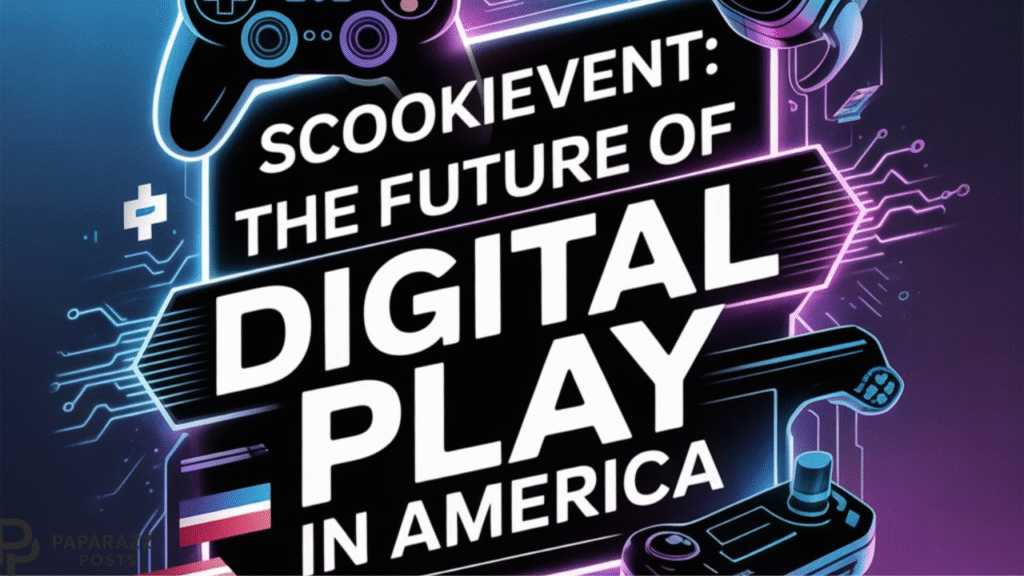When gaming companies and streamers look to captivate U.S. audiences, hosting an online gaming event scookievent becomes a powerful tactic. Whether it’s a live-streamed tournament, a virtual community launch, or an influencer-driven showcase, the right “scookievent” can bridge social engagement, brand loyalty, and competitive excitement. In this blog post, we’ll examine how an online gaming event scookievent can be structured, what current industry data and research suggest, and how organizers can maximise impact—while using best-practice strategies drawn from the U.S. market and tech-driven ecosystems.
What is an Online Gaming Event Scookievent?
An online gaming event scookievent refers to a curated digital occasion centred around interactive gameplay, community participation, live streaming, and branding or monetisation tie-ins. These events may feature esports tournaments, influencer collaborations, in-game rewards, and social-media integration.
According to a recent study published by the Association for Computing Machinery, live streaming and spectator participation are among the fastest-growing dimensions of the industry. Such events operate at the intersection of entertainment, social networking, and digital experiences. As a result, they must consider technology, platform design, user experience, community culture, monetisation, and broadcast quality.
Why Online Gaming Events Matter in the U.S.
In the United States, the online gaming market is booming. For instance, the global online gaming industry was valued at over USD 208 billion in 2024, with the U.S. representing one of the largest segments. The esports market in North America is expected to grow rapidly—driven by live streaming, sponsorships, and hybrid event models.
Therefore, launching an online gaming event scookievent in the U.S. offers brands, developers, streamers, and platforms a chance to tap into broader gamer demographics, engage communities, and drive long-term loyalty and revenue. Moreover, mobile and cloud gaming have reduced hardware barriers, allowing organizers to reach players across multiple devices and time zones.
Key Components of a Successful Online Gaming Event
Platform and Technology
The technical infrastructure is the foundation of any online gaming event. Selecting a platform with low latency, high concurrency, and interactive features is vital. Organizers must ensure secure servers, anti-cheat systems, and seamless streaming to enhance trust and engagement. Cloud technologies and cross-platform compatibility also expand participation opportunities across devices.
Content and Community Engagement
Beyond technology, content strategy determines success. A well-designed online gaming event offers interactive content, such as live tournaments, influencer appearances, and real-time audience engagement. Integrating chat features, polls, and rewards turns the event into a social experience, not just a broadcast.
Research highlights that community-driven interaction fosters emotional connection and repeat participation. Building anticipation through pre-event marketing, teaser videos, and influencer partnerships increases reach and amplifies brand visibility.
Monetisation and Partnerships
Strong monetisation models sustain event longevity. These include sponsorship deals, brand collaborations, microtransactions, and in-game promotions. Aligning with hardware and tech partners boosts audience trust and cross-promotion. Furthermore, ethical monetisation ensures long-term credibility and prevents user fatigue or backlash.
Case Study: U.S. Market Implementation
Consider a weekend-long online gaming event scookievent aimed at U.S. college students. The event could feature:
- Live influencer-hosted matches streamed on Twitch and YouTube.
- Viewer participation via polls and interactive challenges.
- Sponsored gear showcases from major gaming brands.
- Post-event highlight reels and social recaps to maintain engagement.
This model integrates competitive play, entertainment, and community interaction, reflecting how U.S. gamers prefer hybrid experiences. Proper scheduling across multiple time zones and multi-platform access maximizes reach.
Challenges and Best Practices
Technical Limitations
Even with preparation, server overload, lag, or anti-cheat failures can disrupt experience. Investing in cloud scalability and redundancy ensures stability. Pre-event load testing and real-time monitoring are essential to maintaining quality.
Safety and Moderation
With increased social interaction, maintaining safe and inclusive environments is critical. Organizers must employ moderation tools, enforce community guidelines, and protect minors from harmful behavior. Academic literature on online gaming emphasizes responsible moderation to reduce toxicity.
Ethical Monetisation and Regulation
Transparency in monetisation—especially around microtransactions and loot boxes—is vital. Clear communication and fairness strengthen community trust. Staying compliant with U.S. streaming and gaming regulations safeguards operations and brand image.
Measuring Success
Defining KPIs such as participant numbers, viewer hours, engagement rates, and revenue helps evaluate event performance. Post-event analytics and surveys reveal audience satisfaction and areas for improvement.
Future of Online Gaming Events
The next generation of online gaming event scookievents will be immersive, interactive, and data-driven. Key trends include:
- Cloud gaming removing hardware constraints and enhancing accessibility.
- Hybrid events blending physical and virtual participation.
- AI tools enabling personalized experiences and predictive analytics.
- Limited-edition digital collectibles and cross-promotional campaigns driving engagement.
- Social gaming expansion, attracting new demographics and enhancing inclusivity.
As technology evolves, these events will transition from passive viewing to active participation, reshaping how audiences connect globally.
Expert Insight
“The future of gaming events lies not just in competition, but in connection—where audiences, players, and brands converge across formats.”
— Dr. Jenna Roberts, Esports Analyst
This insight highlights that an online gaming event scookievent isn’t just about gameplay—it’s about community, innovation, and digital culture.
Conclusion
In conclusion, an online gaming event scookievent is more than a digital gathering—it’s a movement of creativity, community, and commerce. For U.S. developers and brands, it offers the chance to connect directly with audiences, showcase innovation, and cultivate loyalty.
By focusing on engaging content, reliable technology, ethical monetisation, and community trust, organizers can ensure their events stand out in the competitive digital landscape. As the gaming ecosystem evolves, success will belong to those who create immersive, authentic, and socially connected experiences.


